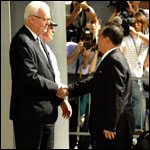U.S. Still Cautious About Next Steps on North Korea Lee Chi-dong | Yonhap News Agency
After "good and constructive" talks with North Korea last week, the United States on Monday maintained a guarded stance on next steps.
|
|
|
Matthew L. Wald | New York Times
The Nuclear Regulatory Commission is approaching completion of an ambitious study that concludes that a meltdown at a typical American reactor would lead to far fewer deaths than previously assumed. The conclusion, to be published in April after six years of work, is based largely on a radical revision of projections of how much and how quickly cesium 137, a radioactive material that is created when uranium is split, could escape from a nuclear plant after a core meltdown. Full Article
Associated Press of Pakistan
Reaffirming its opposition to a US-backed treaty to ban production of fissile material used as fuel for nuclear weapons, Pakistan on Thursday warned that it would boycott any process to negotiate that treaty outside the deadlocked UN Conference on Disarmament—the sole negotiating forum for multilateral disarmament. Speaking in the UN General Assembly, Pakistani Ambassador Raza Bashir Tarar struck a "note of caution" against taking negotiations for the Fissile Material Cut-off Treaty (FMCT) outside the 65-member Conference. Full Article
The Mainichi Daily News
Momentum has been quickly building behind the scenes for an ambitious and controversial project led by the United States and Japan to build a nuclear fuel repository in Mongolia as Washington is trying to secure a memorandum of understanding (MOU) with other countries concerned by the end of this year. The United Arab Emirates has joined the list of countries pursuing the project, and earlier this month the U.S. Department of Energy sounded out other countries concerned about signing a memorandum of understanding on the program by the end of this year. Full Article
Fars News Agency
Secretary of Russia's Security Council Nikolai Patrushev is scheduled to travel to Tehran on August 15 to confer with Iranian officials on different bilateral and regional issues. During his stay in Iran, the Russian official will hold talks with President Mahmoud Ahmadinejad and Secretary of Iran's Supreme National Security Council Saeed Jalili. Russia's Foreign Minister Sergei Lavrov on July 13 had laid out a new "step-by-step" approach that would enable the Islamic Republic to take steps to address the questions raised by the IAEA. Full Article
John Fleck and Michael Coleman | Albuquerque Journal
The pending federal debt-limit deal raises the possibility of deep defense budget cuts and makes it unlikely that plans for a long-term increase in U.S. nuclear weapons spending will go forward, experts said Monday. The National Nuclear Security Administration's budget is one of the largest federal outlays in New Mexico, supporting work at Los Alamos and Sandia national laboratories to the tune of some $3 billion this year, with plans for substantial increases in coming years. Full Article
|

